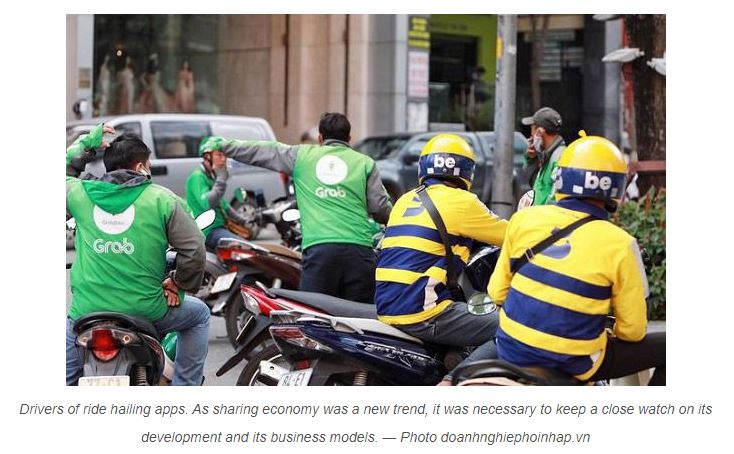Vietnam: Policies needed to ensure sharing economy development is on-track
Sharing economy was not only creating opportunities to increase income but also opening up a new and flexible market, thereby creating a growth engine and increasing productivity for micro, small and medium – sized enterprises.
It was critical to raise appropriate solutions to promote the development of a digital economy and social security for individuals participating in the sharing economy, according to the Central Institute of Economic Management (CIEM).
Dang Thuy Trang, Head of Public Affairs at Grab, said that digital platforms made it easier for enterprises and individuals to develop online sales and delivery channels.
The report by Bain & Company titled “The platform economy: Southeast Asia’s Digital Growth Catalyst” revealed that digital platforms helped 89 per cent of enterprises expand their customer base and 84 per cent have higher sales per customer and 71 per cent report higher profits.
More importantly, 65 per cent of enterprises said they were more likely to recover from the COVID-19 pandemic thanks to the sharing economy.
Trang said that sharing economy was not only creating opportunities to increase income but also opening up a new and flexible market, thereby creating a growth engine and increasing the productivity of micro, small and medium–sized enterprises.
In fact, the sharing economy has proved its superiority in terms of saving resources and minimising transaction costs in economic activities. The use of digital platforms also helps increase the efficiency and transparency of the economy, thereby supplying the State agencies in management, she said.
However, the sharing economy needed appropriate policies to develop on the right track and contribute to promoting the digital economy and ensure social security for individuals participating in the sharing economy, especially in the context that there was an increasing number of people moving to work in companies operating under the sharing economy models.
Luu Duc Khai from the CIEM said that the sharing economy created new relationships in the market, especially three-party relationships, instead of two in economic contracts.
There were problems in ensuring the benefits for both service providers and users, conflicts of interest between enterprises operating traditionally and those following the sharing economic models and difficulties in tax collection.
Meanwhile, the legal framework for managing the sharing economic models remained inadequate.
Khai said that there was a pressing need for improving the State capacity to manage the sharing economy to ensure network security, information safety, the privacy of citizens, organisations and sovereignty in cyberspace.
Vietnam also needed to fully implement international commitments on services market opening, including the Internet service and e-commerce to encourage enterprises to promote business on digital platforms, Khai stressed.
According to Chu Thi Hoa, Deputy Director of the Institute of Legal Sciences under the Ministry of Justice, as the sharing economy was a new trend, it was necessary to keep a close watch on its development and its business models.
At the moment, it was not necessary to enact a separate law to regulate it but amendments should focus on limiting risks that could arise from the development of the sharing economy, including risks to partner service providers and users, risks of peer-to-peer lending turning into usury and risks of personal data breaches.
Hoa said that the State management needed to be flexible to promote innovations and start-ups. For issues of the sharing economy that had not been managed or well understood, consideration should be given to the application of sandboxes.
Source: Vietnam News


 English
English




